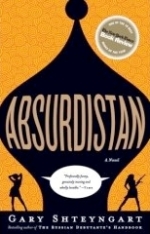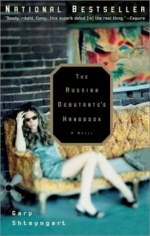A compatriot of mine once said of Russian foreign policy that it was a riddle wrapped in an enigma cloaked in a mystery. Gary Shteyngart (himself a product of Russian policy), is an epicure wrapped in a best-selling novelist, cloaked in a nondescript schlub.
 In an implicit homage to our immigrant forbears by two proud Jewish New Yorkers – an alien from the north of England and a Russian immigrant – we met up in the eastern reaches of New York’s Chinatown, or what used to be the Jewish Lower East Side. I came in from a doctor’s appointment, Shteyngart from a photo shoot at Katz where he devoured a pastrami on rye as a morning snack. For a respected author and scathing global satirist, Shteyngart is remarkably circumspect, even nondescript. The heralded author of the mordantly funny The Russian Debutante’s Handbook (currently in film development by Todd Solondz) is no legend in his lunchtime; sitting at the six-table café Brown – where he knows the owner – we were barely able to attract the attention of the waitress for the check.
In an implicit homage to our immigrant forbears by two proud Jewish New Yorkers – an alien from the north of England and a Russian immigrant – we met up in the eastern reaches of New York’s Chinatown, or what used to be the Jewish Lower East Side. I came in from a doctor’s appointment, Shteyngart from a photo shoot at Katz where he devoured a pastrami on rye as a morning snack. For a respected author and scathing global satirist, Shteyngart is remarkably circumspect, even nondescript. The heralded author of the mordantly funny The Russian Debutante’s Handbook (currently in film development by Todd Solondz) is no legend in his lunchtime; sitting at the six-table café Brown – where he knows the owner – we were barely able to attract the attention of the waitress for the check.
This anonymity does not reflect his quickly rising star – there has been no sophomore slump for Shteyngart whose second novel, the best-selling Absurdistan, made the New York Times list of 100 best books of 2007. Where The Russian Debutante’s Handbook was a little baggy and confessional, Absurdistan is tight and sardonic. Referring to the first book as The Russian Arriviste’s Hand Job and laughing off his alter ego as the wormy little Jerry Shteynfarb, Shteyngart – who takes us around a mid 1990s Prague in his debut novel – envelopes us in the sights, sounds, and tastes of post-Soviet Azerbaijan. It’s a highly unlikely romp that gains credibility from its surehanded narrative tone and traction from its timeliness. Written about the environs of Halliburton’s hidden activities on the Caspian coast before the world knew that the Vice President’s company was feasting on American taxes, the absurdity has special satiric bite. As Shteyngart put it, he was writing a comic novel and he “stumbled into polemics.”
These two novels reflect two of the more apparent aspects of Shteyngart’s philosophy: first, that the world is there to be tasted and second, that literature ought to be fun. The latter is not just a flippant aside but a serious concern. As a teacher of creative writing at Columbia (and this semester at Princeton too) he is worried about the lack of reading. “When I saw the sales figures [for Absurdistan] I thought ‘What the hell’s going on?’ No-one reads, I’m worried about the 18–24 demographic. Can books continue to exist?” On reflection he added, “You know who is actually still reading? The only people reading are women. Two-thirds of the readership of literature are women.” His is not just a standard world-in-decline argument but a belief that “with the exception of some Shakespeare adaptations, the classics are just not accessible these days.” This has led too many people, in his opinion, to “concede too often that literature cannot entertain.” The classics now seem like dry, if intricately literate works that are only of interest to a few. Their main legacy is that they lead authors to aspire to write classics by creating dry, if intricately literate works.
 Flying in the face of the marginalization of the literary, though, is the wonderful crop of current novelists. “I’m on the Powell Books prize committee so I’m reading all these contemporary books and it’s an amazingly good year for literary fiction.” Denis Johnson, James Ferris, and Junot Diaz (“he hit one out of the park”) rate special mentions and Shteyngart’s just found Richard Price and Etgar Keret. We spend a few minutes trading thoughts on our current favourites books and films. He points out that reading is important because “writing is 50 percent reading and 50 percent writing. You need to be immersed in language.” As well as his contemporaries, he reads Russian oldies with a special place for Nabokov (“especially in English”) and he likes American Jewish twentieth century classics – Richler (too neglected), Bellow, and Roth (“He’s a huge fuckin’ influence”).
Flying in the face of the marginalization of the literary, though, is the wonderful crop of current novelists. “I’m on the Powell Books prize committee so I’m reading all these contemporary books and it’s an amazingly good year for literary fiction.” Denis Johnson, James Ferris, and Junot Diaz (“he hit one out of the park”) rate special mentions and Shteyngart’s just found Richard Price and Etgar Keret. We spend a few minutes trading thoughts on our current favourites books and films. He points out that reading is important because “writing is 50 percent reading and 50 percent writing. You need to be immersed in language.” As well as his contemporaries, he reads Russian oldies with a special place for Nabokov (“especially in English”) and he likes American Jewish twentieth century classics – Richler (too neglected), Bellow, and Roth (“He’s a huge fuckin’ influence”).
His emails, as we have been arranging the interview, lament his over-crowded diary – he mock-hopes for his next novel to be a big failure so he can go tuna farming. It seems as though he doesn’t have the time to read that he likes to have, that he feels un-immersed at the moment in the language of anything but teaching. “You need the right playlist – Orwell, Zamyatin, people at the tony school I taught at had never heard of Borges.” A self-ironizing victim of his own success, he feels his “independent spirit dying” as he works his day job teaching ivy leaguers, keeping him covered, finally, by the health insurance that his publishers hope will carry him to decade’s end and beyond (Shteyngart is 35 and, to all intents and purposes, in fine health). From mixing with the authors of today, yesterday, and tomorrow he worries that “We are in an era of unfettered self-expression [with] so little empathy for others” that the writing of our immediate future is bound to be impoverished. He regrets this, but on an aesthetic rather than moral level, it’s “not a judgement just a sign of our times”
We commiserate with one another over the passing of independent bookshops, the visceral experience of finding books at the Strand, of browsing in bookshops and asking store owners about the books. The faux-democratic people-who-liked-this-also-liked-that of Amazon “is evil. You never get surprised, nothing is haphazard, nothing changes my life anymore, everything is predictable.” Chain bookstores hold publishers over a barrel he claims – “If the mafia ran publishing companies things would be better”–bookshops would have to pay up. Channeling The Sopranos: “Whassa matter? You don’t like Sam Lipsyte? How come you don’t wanna pay us for his books?” While passionate about this type of subject and, of course, articulate, Shteyngart is more confident on the page than in the flesh. He is an adept of the written comic event and its scripted response, but in person his straight-faced delivery tends not to leave his audience laugh-time, and, when no laugh is forthcoming, he gets worried that he’s being taken too seriously. When he mentions Denis Johnson he tells me that “I try not to read about Vietnam – I’m a vet so I have too many memories.” It’s wry rather than a zinger and he delivers the joke like someone who works on the page, deadpan and then with an explanation.
Coiled up inside Gary Shteyngart, a world-class sensualist is wrestling with the representative of generations of Russian Jewish guilt. During the seven years he lived in Russia and the many more during which his parents maintained an expatriate Russia within his home, Shteyngart grew up indelibly marked by both his birth country and his adopted city. I’d read that his parents had rationed the television insofar as they had one and they only had Russian books. Shteyngart added that he was able to fake his way through a Math and Science high school because his father tutored him from Russian school textbooks – “American fifth grade textbooks had pictures of balloons floating around – ‘How many balloons are there?’ but the Russian fifth grade textbooks were all about logarithms and algorithms.”
 Our ostensible reason for meeting is the forthcoming Zeek print edition about the Russian Jewish diaspora. Shteyngart’s not part of an organized Russian Jewish community but he frankly admits he is inextricably caught up in the culture: a product of that network of similar Jews who came from Kiev, Moscow, Minsk, St. Petersburg (only the Bukharans of the Soviet ethnicities are a strange, foreign, Asiatic entity) with engineer fathers and piano teacher mothers. Now his main contact with his heritage is through cuisine, when he hangs out in Brighton Beach or sometimes at 108th St. in Queens with Uzbek Jews at Israel Kosher Salute! (not so much at the nevertheless well-named Chinese restaurant there, Cho Sen).
Our ostensible reason for meeting is the forthcoming Zeek print edition about the Russian Jewish diaspora. Shteyngart’s not part of an organized Russian Jewish community but he frankly admits he is inextricably caught up in the culture: a product of that network of similar Jews who came from Kiev, Moscow, Minsk, St. Petersburg (only the Bukharans of the Soviet ethnicities are a strange, foreign, Asiatic entity) with engineer fathers and piano teacher mothers. Now his main contact with his heritage is through cuisine, when he hangs out in Brighton Beach or sometimes at 108th St. in Queens with Uzbek Jews at Israel Kosher Salute! (not so much at the nevertheless well-named Chinese restaurant there, Cho Sen).
To his surprise, when he’s in San Francisco the 79ers (no, not the 49ers) often come out to support him. He explains that they are IT folk who came over from the USSR in or near 1979, as he did, with a large number of Soviet Jews allowed to emigrate around the attempted re-signing of the SALT II agreement. His surprise is not that they come out, but that they exist at all as a group and that, despite their manifoldly different experiences and professions, he kind of shares the sense of a bond with them. For someone used to viewing life from the margins he’s touched by being an emotional focus. Both in his books and in person he talks about his deep relationship with his grandmothers and the 79ers seem to touch, however lightly, the same chord.
One of the main driving forces for his creativity is this tension between the spartan ideology of Soviet and post-Soviet Jews–whether in Leningrad or Queens–and the cultural and gastronomic smorgasbord of New York. As well as teaching and writing novels, Shteyngart is a contributing editor to the New York Times Travel and Leisure section. In one of the world’s dream jobs, he is paid to travel the world and testify to touristic and gustatory delights. This summer he heads to four new exotic destinations and, although he sounds wearied by the prospect, that’s more due to how busy he currently finds himself and having to consequently cram four reports into a tight timeframe. There’s a serious sensual beat to tread, Brazil follows up his trips to Russia and Azerbaijan with Hong Kong, Seoul, and Bangkok. It’s a true craft. Like a doctor, a writer is always on call, you always have a pad to make notes: sometimes they are for the fiction, sometimes for the tourists. There’s not much difference, he speculates, except that “people who go to Central Asia need real places to visit!”
When I ask him whether Misha Vainberg’s unlikely bulk in Absurdistan is offensive he responds “I love fat people – I was fat for a long time. For my bar mitzvah they had to make me a special suit – husky.” I suggest that Misha is not just fat but uber-fat and a cipher for the dangers of hyper-consumption, and he tells me that Misha started off fatter even but he had to trim his protagonist down by a few pounds to make the events physically possible. “Yes,” he continues impatiently “Misha stands for ‘hyper-consumption’ but it’s as much the immigrant mentality–my grandmother would sit with me and feed me hamburger after hamburger. She would crack open bones and suck the marrow out.”
 Shteyngart has moved on from the substance (not least, he is now barely 120 pounds) but not the spirit. We are eating a light and tasty lunch – he orders the granola and yogurt bowl to gently shepherd Katz’ pastrami into his Jewish belly, I order the fragrant, crispy portabello sandwich whose aged manchego adds a couple of surprisingly fruity notes to a savoury vegetable dish. His infectious enthusiasm for the food is such that I get the feeling we could have spent the whole three hours discussing our own lunches and other people’s books.
Shteyngart has moved on from the substance (not least, he is now barely 120 pounds) but not the spirit. We are eating a light and tasty lunch – he orders the granola and yogurt bowl to gently shepherd Katz’ pastrami into his Jewish belly, I order the fragrant, crispy portabello sandwich whose aged manchego adds a couple of surprisingly fruity notes to a savoury vegetable dish. His infectious enthusiasm for the food is such that I get the feeling we could have spent the whole three hours discussing our own lunches and other people’s books.
Shteyngart went to college in the Midwest at Oberlin. “They can’t make sense of ShteYngart in the Midwest,” he says. The terrible and funny misrepresentation of the slavic version of ‘Stein,’ ends in trouble out there, “Mr. Shtygrant? Mr. …Shitty? … I’m sorry, what’s your name?” Despite his ongoing disparagement of Oberlin in his fiction as the Accidental College where all the fantasies and foibles of a disconnected ivory tower take place in a Midwest setting, it sounds like he learned two important lessons there. First, that responsible, respectable people beyond his own group of friends thought that he could write and second, that “as an aspirational son of immigrants who thought he always had to do really well in class, I realized that it was a possibility not to give a shit.” As the various desirable women of his first two novels suggest, he also has an enduring fascination for the area and the corn-fed whitefolk who live out there.
Now he is moving out of Brooklyn to the Midwest for the central subject matter of a book. His new novel about the future of the United States is being written in a “nice quiet town upstate with good meth.” In an attempt to “change [his] mindset” he wanted to write about the States. So, instead of the fictionalized dystopias of Eastern Europe developing gangster capitalism as communism collapsed, he has settled on a fictionalized dystopia of collapsed capitalists here. He “fast-forwards to the end of the slow-motion collapse through which we are living” but, just to make himself feel at home, he will trace it through the eyes of a couple of first-generation Americans, a Russian, and a Korean.
To everyone’s surprise, America embraced Shteyngart’s comic New Yorkers heading into the dismembered remnants of the Soviet empire. America is ready to laugh at others, and to read his epicurean appreciation of the finer things of life, but might not be ready for his wry appreciation of the self-inflicted decline of American confidence and global power. If America isn’t ready, he’ll just have all the more time to read some good books and eat some good food – and that’ll suit him just fine.








I would really love to guest post on your blog.*~`~;
Perhaps you should update the php server on your webhost, WordPress is kinda slow..”.,-
There is certainly noticeably a bundle to know about this. I assume you produced certain nice points in functions also.
I was also reading a topic like this one from another site.:-.”,
Whats up, I’ve been ranking my site higher “PROFIT INSIDERS REVIEW”.
the idea beach towel should be colored white because it reflects heat away`